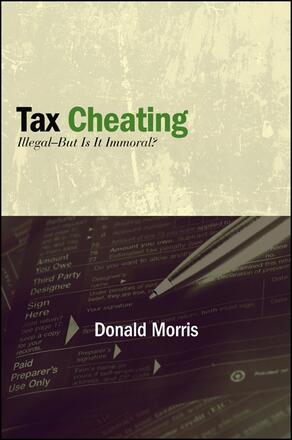
Tax Cheating
Illegal--But Is It Immoral?
Alternative formats available from:
An examination of the ethical issues surrounding tax cheating and implications for public policy.
Description
Silver Winner, ForeWord Book of the Year in the Political Science Category
Finalist for the 2013 Eric Hoffer Book Awards presented by Hopewell Publications
From unreported gambling winnings and inflated claims of the value of clothing donated to charity to money hidden in Swiss bank accounts and high-profile tax schemes plotted by celebrities and business leaders, the range of tax cheating opportunities is wide and the boundaries and moral status can be hazy. Considering the behavior of individuals and small businesses as well as the involvement of congress and the IRS, Donald Morris combines insights from law, psychology, sociology, criminology, accounting, economics, and philosophy to examine the ethical issues surrounding tax cheating and implications for tax policy.
Donald Morris is Associate Professor of Accounting at the University of Illinois Springfield. He is a CPA, Certified Fraud Examiner, and a former tax practitioner with eighteen years of experience, including ten years as owner of his own firm in the Chicago area. He is the coauthor (with Lois Ruffner Plank, Bryan R. Plank, and Christie Plank Ciraulo) of Accounting Desk Book: The Accountant's Everyday Instant Answer Book, 2011 Edition, and the author of Opportunity: Optimizing Life's Chances and Dewey and the Behavioristic Context of Ethics.
Reviews
"…a unique perspective on the federal tax system in the US … While many readers will disagree with [Morris's] conclusion … the value of the book lies in the journey. " — CHOICE
"This is not a how-to guide for tax cheaters, nor is it a green light to cheat. The author defines tax cheating as paying less than the law says we owe, whether this is done deliberately or not. His point is that Congress has the obligation to revise the Tax Code to make it simple, transparent, and equitable, so that all taxpayers should know what constitutes their fair share. Morris draws on a large pool of tax cases, experts, and moral philosophers to make his case, and he is grounded in the experience of ten years as a small business owner and tax preparer. " — Richard P. Mullin, author of The Soul of Classical American Philosophy: The Ethical and Spiritual Insights of William James, Josiah Royce, and Charles Sanders Pierce
"Morris gives us a thorough collection of thoughts and quotations about a sensitive subject—how do morals and ethics affect the completion of a tax return? Who is more unethical, Congress in writing the current tax law or the taxpayer in paying 'too little' tax? What motivates a citizen to 'volunteer' to pay a tax bill? Does Congress really want to close the tax gap? Should a court apply only the letter of the law in a tax case, or should a higher moral principle also apply? By approaching the term 'cheating' in a morally neutral manner, Morris removes much of the baggage that restricts the usual talk about taxes—the book allows for a more fruitful review of the economics of the deal between the citizen and the government, that we call taxation. Intriguing, fresh, accessible, up to date. " — William A. Raabe, coauthor of Federal Tax Research, Ninth Edition